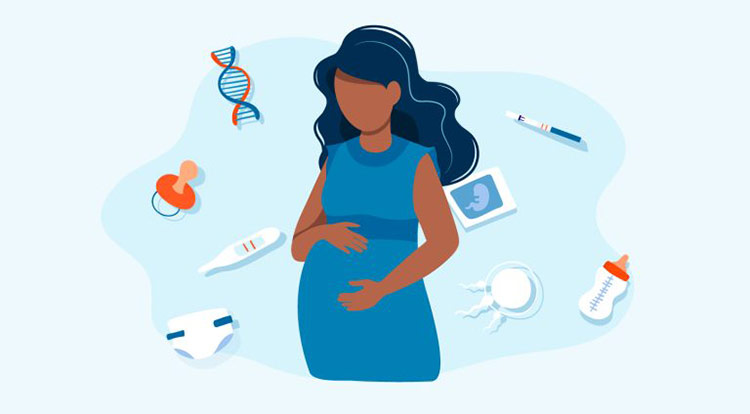Whether seeking financial stability before starting families or adding a final member to their broods, expecting moms in their 30s will experience pregnancy far differently than women in their 20s.
Women in their 30s have a higher likelihood of needing C-sections and a higher likelihood of developing problems like high blood pressure, gestational diabetes, and other complications. But, notwithstanding these things, pregnancy after 30 is still perfectly safe with the appropriate prenatal care.
Expecting moms in their third decade of life must be diligent about getting regular prenatal care, receiving STD testing early on, and taking other steps to mitigate the risks that are predominant among this age group. As a matter of fact, U.S. birth rates among women in their 30s are currently the highest that they’ve been in more than 40 years.1
Pregnancy Risks and Benefits After 30
Pregnancies that occur after the age of 30 are often deemed high-risk solely based on the age of the expecting mother. However, pregnancy is frequently considered ultra high-risk after the age of 35.2 This is because, in addition to health issues that affect expecting moms, pregnancies that occur in women who are 35 and older include several risks that directly impact the health of their children.
Risks
Common issues among pregnant women who are 30 and older include:
- Gestational diabetes
- Hypertension
- Increased risk of miscarriage
- Potential need for emergency C-section
- An increased likelihood of existing lifestyle disease
For women after 35, pregnancy risks include a higher likelihood of:
- Birthing multiples
- Low birth weight
- Premature birth
- Miscarriage
- Stillbirth
- Chromosomal abnormalities
Benefits
Modern women still have tremendous resilience and stamina as they enter their 30s. With an increasing focus on self-care, preventative medicine, stress management, and whole-health strategies, women are aging better and are more easily able to greet the challenges of both childbirth and child-rearing later in life.
If you’ve been dreaming of having your own baby (or another one), having one at this stage is guaranteed to increase your quality of life. You’ll get a lasting sense of fulfillment, a new purpose, and plenty of joy. Moreover, women in their 30s are usually far more financially stable than women in their early 20s and are more likely to be secure in their relationships. Thus, despite the various risks that pregnancy post-30 entails, women in their 30s are usually ready to offer their little ones better financial, emotional, and familial stability.
Tips For Healthy Pregnancy in Your 30s
A woman is still considered fertile in her 30s. As such, getting pregnant at this time is something the body is designed to do. However, regardless of age, it is still crucial for women to maintain healthy life habits, receive regular prenatal care, and proactively mitigate known risks. One of the ways to start risk mitigation is by identifying and addressing lifestyle diseases. These include:
- Obesity
- Hypertension
- Coronary artery disease
- Lung disease
- Sexually transmitted diseases
If you smoke, you should stop right away. Your doctor can help you establish an effective smoking cessation plan before you get pregnant or if you’re already pregnant.
Although you’ll need more calories during your pregnancy to support your growing baby, you should work with a nutritional consultant if you currently have any weight-related health issues. Your primary doctor or OB/GYN can also establish a plan for successfully managing diabetes, hypertension, or other weight-related problems.
Finally, all expecting women, irrespective of their age, should be tested for STDs, including HIV, gonorrhea, chlamydia, herpes, HPV, hepatitis, and others. Detecting and treating STDs early-on limits the risk of miscarriage, stillbirth, and passing dangerous infections in vitro or to newborns.3
Verdict: Is it OK to get pregnant in your 30s?
Getting pregnant in your 30s entails several risks that women are unlikely to face in their 20s. However, these risks are hardly a reason to stop celebrating the forthcoming arrival of your baby. Instead, they’re ample motivation to start doing all you can to take good care of yourself and ensure a healthy pregnancy.
Priority STD testing offers comprehensive testing for sexually transmitted diseases for women who are currently expecting or trying to conceive. Find a testing lab near you today to take this all-important step in protecting your little one’s health.
Sources
- “Risks of Pregnancy Over Age 30.” University of Rochester Medical Center. Accessed May 25, 2022. www.urmc.rochester.edu/encyclopedia/content.aspx?contenttypeid=90&contentid=P02481.
- “Pregnancy after 35: Healthy moms, healthy babies.” Mayo Clinic. February 10, 2022. www.mayoclinic.org/healthy-lifestyle/getting-pregnant/in-depth/pregnancy/art-20045756.
- “STDs during Pregnancy – CDC Fact Sheet.” Centers for Disease Control and Prevention. April 12, 2022. www.cdc.gov/std/pregnancy/stdfact-pregnancy.htm.

